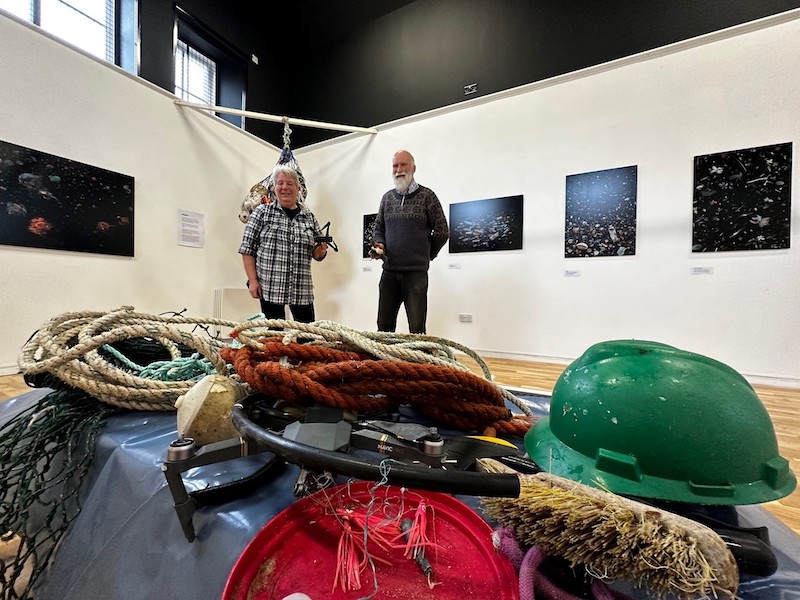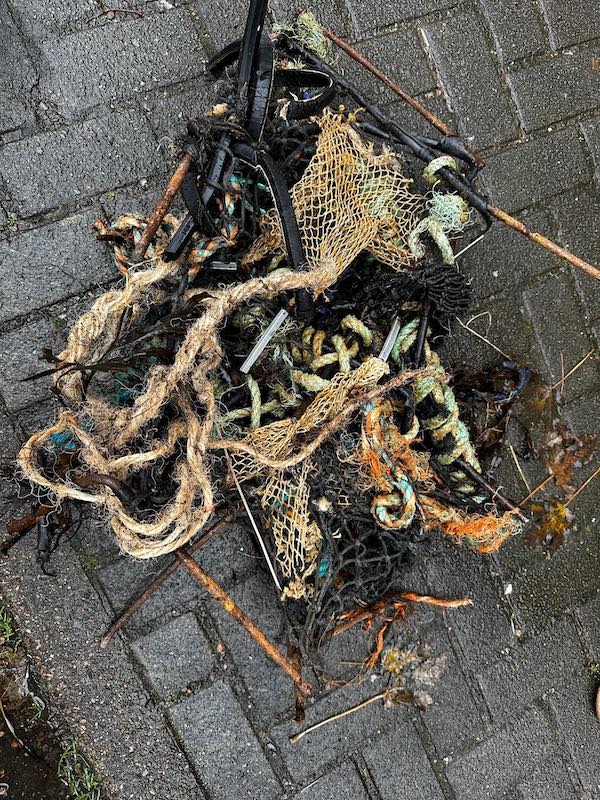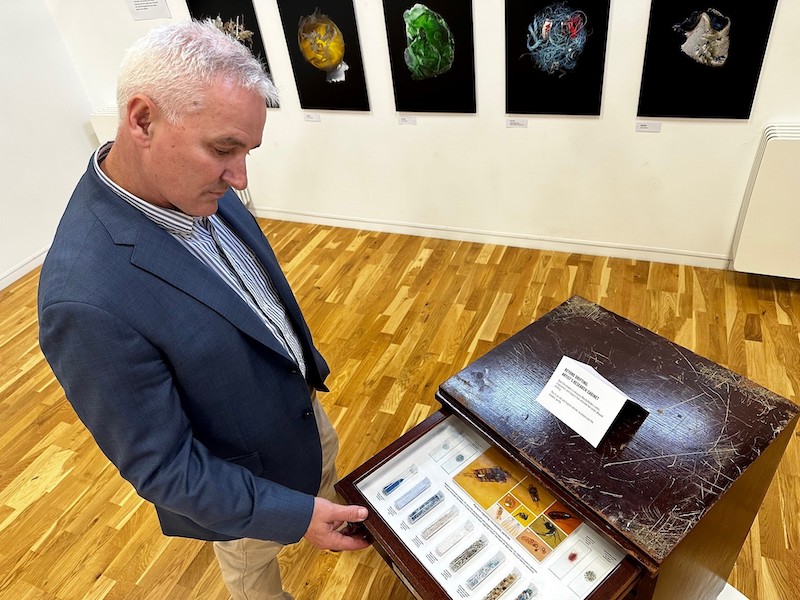The chair of Highland Council’s Climate Change Committee visited a touring exhibition by international award-winning photographer Mandy Barker today (24 October) to highlight the scourge of plastics in our seas.
Caithness Councillor Karl Rosie took the opportunity to check out Mandy’s thought-provoking and powerful ‘Our Plastic Ocean’ exhibition when it arrived at Thurso Library and Art Gallery this week (22nd October – 3rd December).
The exhibition addresses the current global crisis of marine plastic pollution and showcases Barker’s powerful and captivating photographic images, featuring debris she has collected from shorelines across the world.
Having recently taken over the chair of Highland Council’s first ever Climate Change Committee, Cllr Rosie was keen to highlight the issue of plastics around Highland’s coastlines and encourage people to do more to help protect the marine ecosystem.
He said:
“It is estimated that approximately eight million tons of plastic end up in the world’s oceans every year.
“I read recently, that if this trend continues until the year 2050, it could result in our oceans containing more plastic than fish!
“This is very much a global issue but one we are sadly not immune to here in Caithness and in other areas of Highland.
“Despite the warnings and high-profile campaigns by luminaries such as Sir David Attenborough, plastic is still being discarded in and around our coastlines and threatening our marine life.
“And the threat to marine life presents an inexorable threat to humans if we don’t take collective action now.”
The Climate Change Committee chair insisted the protection of our beaches and marine ecosystem is “everyone’s responsibility,” and suggested a number of ways people can help.
- Don’t litter, make sure your footprints are the only things you leave on the beach
- If you see litter near the coast pick it up and put it in a nearby bin or take it home and recycle it – it’s a small step, but if everyone did it, it would make a difference
- Volunteer to take part in a local beach clean. Check on social media or with local environmental groups/charities to identify opportunities
- Recycle and reuse all your waste, wherever possible
- Buy ethically and locally produced foods
- Avoid single use plastics (which are now outlawed in Scotland)
- Support environmentally friendly brands
Litter can have catastrophic consequences for marine life and plastic waste is extremely hazardous.
The chemicals in plastic can make an animal or fish very sick, or even kill it, if ingested.
Larger pieces of plastic can injure marine like dolphins or seal.
They can get tangled in discarded plastic, such as fishing nets and lines dumped in the ocean.
Plastic which holds soft drink cans together are particularly dangerous to sea life and birds as they may not be able to swim, fly, feed or even grow if plastic becomes wrapped around its body.
Cllr Rosie also highlighted some of the fantastic work being done by volunteer groups in Caithness to clean up the area’s coastlines and commented on the latest find on the beach at Dunnet.
A large hawser was found at Dunnet on 28 September 2022 and removed the following day.
It weighed 584lbs.
There was also 187lb of miscellaneous plastics removed on 29 September and another 101lbs item picked up the day before.
Cllr Rosie said:
“It is extremely sad that people are throwing these things into our seas and not caring one bit about the affect it will have on our marine wildlife.
“I would urge anyone who witnesses this type of illegal dumping to contact either our Environmental Health Team, the Maritime & Coastguard Agency or Police Scotland and report it.
“Photos or videos of those you catch in the act would also help a great deal.”
Also attending the exhibition today was the founder of volunteer group Caithness Beach Cleans, Dorcas Sinclair and her husband Allan.
Since forming the group on 3 March 2019 Dorcas and their volunteers have collected nearly 45.89 long tonnes of plastic from beaches in Caithness alone.

The group has already collected 8.88 long tonnes this year alone.
Dorcas said:
“Over 95% of the plastics we recover (by weight) is fishing related.
“We recover creels, creel rope, creel dippings, other creel items, links, hooks, floats and fenders.
“The most annoying items are cuttings of ropes/nets when creels are put together.
“It’s not uncommon to find a bit of net rolled up, which is full of rope cuttings that have been thrown into the sea.”
She added:
“We also find plastic food bags, some of which have foreign markings, and which we can only assume are thrown overboard from boats.
“The same goes for the food containers we find.”
In the summer months the group sees a sharp increase in the number of discarded plastic bottles, food wrappers, disposable BBQs and strangely, men’s underpants.
Dorcas said:
“I can only guess that people are going swimming and then just leaving their wet underpants behind.”
A quarter of a ton of particularly dirty plastic was removed from Dunnet Beach in one weekend.

Dorcas said this was plastic which had likely been on the seabed for quite some time.
This coincided with dredging operations that were going on at Scrabster at that time.
Some of the more unusual things found by the Caithness Beach Cleans group include:
- 10 miles of pallet strapping all in a big bundle
- 1 kilometre of coaxial cable
- Bits of plastic seating benches
- Drones
- Shoes
- Prosthetic limb covers – these came from containers which were lost at sea.
- At one beach on the east coast of Caithness, which is very difficult to get to, the group removed over 400 plastic bottles that had gathered over time and lots of plastic drums (used as floats by fishermen).



